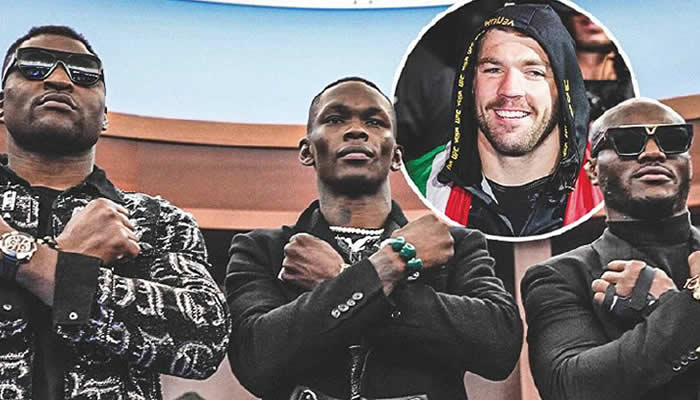The landscape of African mixed martial arts has undergone a significant transformation, marked by the rise of Dricus du Plessis and his subsequent inclusion into the elite fraternity of African UFC champions. Formerly known as the “Three African Kings,” comprising Israel Adesanya, Kamaru Usman, and Francis Ngannou, the group has now been rebranded as the “Four Horsemen,” formally acknowledging du Plessis’s ascension to championship status. This evolution signifies not just an increase in the number of African titleholders, but also a symbolic shift in the narrative surrounding African representation in the UFC.
Kamaru Usman, a former UFC welterweight champion, publicly welcomed du Plessis into the fold during an appearance on the Pound 4 Pound podcast with Henry Cejudo. Usman’s words carried a weight of significance, acknowledging the power and responsibility that comes with being a champion, particularly one who represents a continent. His statement, “With great power comes great responsibility. When you have that platform and you have that mic in your hand, you have to be careful with what you say,” speaks to the broader impact these athletes have beyond the octagon. He then formally recognized du Plessis, stating, “Dricus du Plessis is the fourth African champion right now, so there are four horsemen. We’ve moved on from the three kings to where now it’s four horsemen.” This inclusive gesture marked a turning point in their relationship, setting aside past controversies and embracing a shared African heritage.
The inclusion of du Plessis into this esteemed group follows a period of contention. Du Plessis had previously sparked controversy by claiming to be the only “real” African champion, questioning the African identity of Usman, Adesanya, and Ngannou due to their training bases outside the continent. This ignited a debate about the definition of African identity and representation within the UFC. However, the narrative shifted dramatically after du Plessis’s fight against Adesanya. Despite the intense competition, a newfound respect emerged between the two fighters, paving the way for reconciliation and the eventual acknowledgement of du Plessis as a legitimate member of the African champions’ circle.
Du Plessis responded to Usman’s gesture with gratitude and a recognition of the unifying power of sport. He acknowledged the inherent rivalries that exist within the competitive landscape of MMA, while emphasizing the importance of mutual respect and recognizing shared achievements. His statement, “What the four of us have achieved is incredible and for me being a part of that, it’s amazing and I appreciate it,” highlights the significance of this collective accomplishment for African representation within the sport. The formation of the “Four Horsemen” represents more than just individual titles; it symbolizes a collective triumph for African athletes on the global stage.
The future trajectories of the “Four Horsemen” are filled with anticipation and potential. Du Plessis is preparing to defend his newly acquired middleweight title in a rematch against Sean Strickland, a fight that will test his mettle and solidify his position within the division. Meanwhile, Francis Ngannou, who recently parted ways with the UFC, has secured a victory against Renan Ferreira in the Professional Fighters League, demonstrating his continued dominance and ambition outside the UFC’s banner. Kamaru Usman, after an unsuccessful foray into the middleweight division against Khamzat Chimaev, is planning his return to the welterweight category, aiming to reclaim his former glory and reassert his dominance in the division.
The emergence of the “Four Horsemen” marks a pivotal moment in the history of African MMA. It signifies the growing influence and impact of African athletes within the UFC, and represents a powerful narrative of perseverance, talent, and unity. The individual journeys of Usman, Adesanya, Ngannou, and du Plessis, although distinct, are interwoven by a shared continental heritage and a commitment to excellence. Their collective success serves as an inspiration for aspiring African fighters, demonstrating the potential for greatness and the power of representation on a global platform. As these four athletes continue to compete and evolve, they carry the weight of a continent on their shoulders, pushing boundaries and redefining the narrative of African excellence in mixed martial arts.


